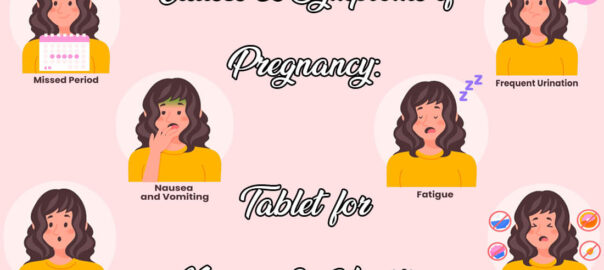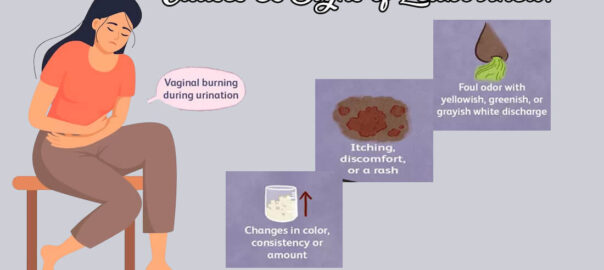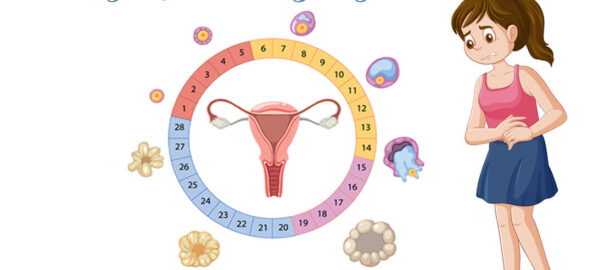
Image by diana.grytsku on Freepik
For many women, menstrual cycles can be a confusing and sometimes uncomfortable part of life. However, when periods become irregular or cause severe pain, it’s important to understand the different abnormal periods and seek ayurvedic pills for abnormal menstruation, available exclusively at Eherbcart.
Abnormal Menstruation
It can vary from light or heavy bleeding, missed periods, painful cramps, and even spotting between cycles. Understanding the causes and symptoms of abnormal menstruation is essential, as it can indicate underlying health issues. So let’s dive in and unpack what you need about irregular menstruation.
Types of Abnormal Menstruation
Abnormal menstruation can take on many different forms. Some women may experience heavy bleeding during their periods, while others may miss their period entirely. Others may have irregular cycles, with menstruation occurring more frequently or less often than usual. Identifying the type of abnormal menstruation you are experiencing is essential to properly address any underlying health issues; women can also prefer effective pills for regular menstrual cycle.
1) Menorrhagia:
Menorrhagia is a common type of abnormal menstruation. As someone who has experienced heavy bleeding during their period, I know how frustrating and uncomfortable it can be. Menorrhagia is a condition that affects many women, making periods longer and more intense than usual. But fret not; there are ways to manage the flow and ease the discomfort. But the good news is that it can be managed effectively with proper treatment and guidance.
What causes menorrhagia?
Heavy menstrual bleeding, or menorrhagia, can have various causes, including hormonal imbalances, uterine fibroids, polyps, adenomyosis (The condition where the lining of the uterus infiltrates the muscle), and other factors. It is a condition where women experience heavy menstrual bleeding lasting several days. It can lead to fatigue, weakness, and anaemia, ultimately affecting their daily routine and lifestyle.
2) Amenorrhea:
If you’re a woman who has recently missed a period, it could cause concern. Cutting a period can signify amenorrhea, the absence of menstrual periods for several cycles. It can affect many women at some point due to various causes, including pregnancy, breastfeeding, menopause, or certain medical conditions.
It’s a common experience for women to get anxious when they miss their period, especially if their menstrual cycle is usually regular. If you’re experiencing this, don’t worry, you’re not alone! There are many possible reasons why your period may be late or absent altogether. Let’s take a closer look at the possible causes.
Causes of Amenorrhea include:
- Pregnancy: The most frequent reason for missed menstrual cycles is being pregnant. If you’re sexually active and experience symptoms like nausea, vomiting, or breast tenderness, you might want to take a pregnancy test.
- Primary ovarian insufficiency (POI): Premature ovarian insufficiency (POI) is a condition where the normal functioning of the ovaries ceases before the age of 40. It leads to decreased estrogen production, which can result in amenorrhea.
3) Oligomenorrhea:
Have you ever missed a period or had a cycle that lasted much longer than usual? If so, you may have experienced oligomenorrhea, a condition characterized by infrequent or irregular menstrual periods. While it’s not as commonly discussed as amenorrhea (the absence of menstruation), oligomenorrhea affects many women and can significantly impact their reproductive health and overall well-being.
Causes of Oligomenorrhea
Hey, my fellow ladies out there! If you’re reading this, chances are you might be experiencing oligomenorrhea or know someone who is. And in case you need to become more familiar with the term, it means having infrequent periods, with cycles that are longer than 35 days. It can be confusing and concerning, so let’s dive deeper into what could cause oligomenorrhea.
Hormonal Imbalance
One common cause of oligomenorrhea is hormonal imbalance, which means your body isn’t producing hormones in the right quantities or at the right times. It can happen for several reasons, such as stress, weight changes or exercise habits, and medical conditions like polycystic ovary syndrome (PCOS). So why do these hormonal imbalances occur? Quite a few factors can throw things out of whack down there. Let’s take a closer look at some of the most common reasons why we might experience hormonal imbalance:
- Stress: It’s important to prioritize managing stress since it can cause hormonal imbalances. When stressed out, our bodies release cortisol – a hormone that impacts everything from our blood sugar levels to our immune system. But cortisol also interacts with other hormones, such as estrogen and progesterone, which can throw things out of balance.
- Diet: Our mood and productivity can be influenced by the food we consume. When we eat unhealthy foods, we may feel sluggish or experience a sugar crash, making it difficult to focus on work or stay motivated throughout the day. On the other hand, when we eat a balanced diet full of nutrient-dense foods, we may feel more energized and alert.
4) Dysmenorrhea :
Dysmenorrhea refers to painful menstrual periods, commonly known as menstrual cramps. While mild discomfort is normal, severe or debilitating pain that interferes with daily activities could indicate an underlying condition such as endometriosis, adenomyosis, uterine fibroids, or pelvic inflammatory disease.
Hey there, ladies! We all know that time of the month can be a bit of a downer. But it can be a real pain regarding dysmenorrhea or painful periods. But just because period pain is common doesn’t mean we must suffer. Here are some tips to help alleviate period pain; let’s dive into what dysmenorrhea is and some ways to deal with it.
Heat therapy:
- One of the best ways to apply heat therapy is with a heating pad. Heating pads are easy to use and available in various sizes and shapes, making them a versatile tool for pain relief. You can use them for any pain or discomfort, from menstrual cramps to back pain to sore muscles.
- To alleviate menstrual pain, applying heat to your lower back and abdomen can be helpful. One effective way to relieve muscle tension is using a heating pad or soaking in hot water can effectively relieve cramps. But suppose you’re one of those who need help to stand the idea of another cumbersome item taking up valuable bed space. In that case, you’ll be pleased to know other ways to apply heat to your lower abdomen and back without using a hot water bottle.
Use a Warm towel.
- A practical alternative is a warm towel if you are without a heating pad or hot water bottle. To prepare, take a bowl of hot water and soak the towel in it. It should provide the warmth you need. Wring out the excess water, then apply the warm towel to the affected area. You can repeat this process several times until you feel relief.
It’s not just heating pads and hot water bottles that can relieve aches and pains. Warm towels can also be incredibly effective. Here’s why:
Heat increases blood flow
- When heat is applied to a targeted region of your body, the blood vessels expand, facilitating blood flow. This amplified circulation can aid in mitigating discomfort and swelling while also supporting the process of recovery. Heat therapy is especially effective for muscle pain and stiffness, as it can help to relax tense muscles and improve flexibility.
Conclusion
Abnormal menstruation can be a tricky subject to navigate. However, by understanding the various types and their symptoms, you can better identify when to seek medical attention. It’s important to listen to your body and not dismiss any unusual changes in your menstrual cycle. If you experience severe pain, heavy bleeding, missed periods, or spotting between processes may indicate underlying health issues requiring pills to help regulate periods.
Remember that seeking proper assistance at the right time can greatly reduce the risk of complications and long-term health problems. This blog has provided valuable insights into abnormal menstruation and its potential risks. Stay informed and make informed decisions for a healthier you.










